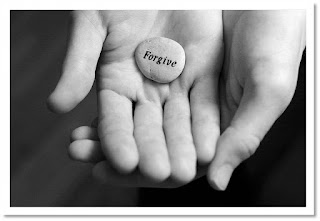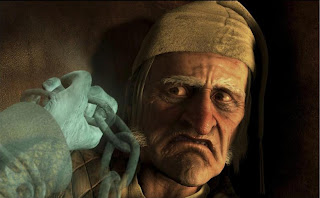That's unfair!
But fairness is not the only thing we are wired for. God is just and fair. But He is also loving and merciful. Even as Jesus hung on the cross, His focus was to plead with the Father - yes, they're doing a terrible thing, but forgive them, they do not know what they do. He even tells the undeserving thief on the cross next to Him that, like the last minute worker entering the vineyard, because of his last minute faith, he will be in heaven with Him.
Since we are made in His image, we too understand love and undeserved mercy. Friends may wrong us, even family may betray us. But because we love them, we can say, I forgive you.Yet forgiveness doesn't occur in a vacuum. As a father, I may forgive my children's wrongs. And this is healthy for me as a parent, as I release the hurt that I feel. But my child cannot receive the benefit of forgiveness if he or she is not there. A child may decide to do without the father's love by running away and refusing to forgive him or herself. Or perhaps the child may believe that he or she did nothing wrong, and therefore why should forgiveness be required at all?
The story is told of young Johnny who was playing with his catapult. He decides to shoot at his grandmother's pet duck for fun, and to his horror, ends up killing it. He quickly hides the duck, but when he looks up, he sees his sister Sally looking at him knowingly.After a quiet lunch, grandma says to Sally, "Let's do the dishes". And Sally says, "Oh Johnny said he wanted to do the dishes, right Johnny?" And she whispers to Johnny, "Remember the duck!". So Johnny meekly agrees to do the dishes.
Later on, grandpa says, "Let's go fishing at the river!" But grandma says, "Sorry, I need Sally to help make supper." And Sally exclaims, "Oh, Johnny said he wants to do it, and whispers, "Remember the duck!" to her brother again. So Johnny helps his grandma while Sally goes off to have fun.
This goes on for days, until Johnny finally can't take it and confesses to grandma what he'd done to the duck. And Grandma gives him a hug and says, "I know. I saw the whole thing. I love you and already forgave you. But I did wonder how long you'd let Sally make a slave out of you."
In a folksy kind of way, that's what the Good News of Jesus is about. God knows our sin. Justice demands punishment. Forgiveness is unfair. Johnny did deserve punishment. Yet because God loves us, He has already forgiven us.But forgiveness doesn't work if we don't accept it. We may refuse to accept that we've done anything really wrong, and so obviously we don't receive forgiveness, even if it is readily available. Or we admit our mistakes, but go on stubbornly bearing our burdens, and so be unable to benefit from forgiveness. Like Johnny, we must be reconciled with the forgiver, and accept forgiveness.
The amazing thing is this. We don't have to run around trying to find God to forgive us. God doesn't just stand safely inside a house, with His forgiven and beloved family, and say to those outside, sorry, you're gonna burn in the fire outside.We are all already inside our own houses. We think we're safe from the chaos outside, but we're really running out of food (all our lives on this earth are finite!) and He's outside, going to every house, holding back the disaster, while patiently knocking on the door, and saying I have the supplies you need, let me in!
But, hey, that's not fair! What if I didn't know that forgiveness was available like that? What then? Well, here I am telling you. It is available. God made me get up early this morning to write this thing so you'd know. Knock knock, knock knock. And now you can choose to receive it.
But, but, what about the people on Boondocks Island, who've never heard? This is a good question, and I don't know the answer. In fact, no one can know for sure, until we go there. How do we know what they know about God, or what God has spoken to them, through people or signs or dreams or the wonder of creation, or if they will believe, until we go there?It's like a spiritual Schrodinger's Cat. The famous quantum physics thought experiment involves a cat in a closed box, where a vial of poison will kill it if a random subatomic event occurs and the Geiger counter detects the ensuing radioactivity. Yet no one can possibly know if the cat is dead or alive until you open the box.
In his book "The Screwtape Letters", C.S. Lewis observed that all men will have some benevolence, and some malice, in their souls. A great way to make a man ineffective is to "direct his malice to his immediate neighbours" and "thrust his benevolence out to the remote circumference, to people he does not know". "The malice thus becomes wholly real and the benevolence largely imaginary."In this way, we can choose to be frustrated with the flawed, imperfect people who God sends to us and reject God's forgiveness, because to receive this favour seems unfair to people far away!
In my limited finite mind, I cannot know if a particular person will be saved by God until I go there, open the box, and tell them about Christ. In my limited mind, I think, how nice it would be if everyone was saved, as long as we all did our best. But I don't get to make the rules. In fact, thank God I don't. If human philosophy was so great, and "doing our best" was the answer, our world wouldn't be in the mess it's in. Look at the rules we have made for this earth and all the tremendous human effort of millenia - has any of that worked at all, in any society, rich or poor, religious or secular?But God, who operates everywhere, knows. In His infinite wisdom and love, I know He knows what He's doing. He is a God who understands the Universe better than me (thankfully!). He offers a solution that the wisdom of this world doesn't offer (including to those on Boondocks Island, whom He loves much more, and much better than I can even imagine!). His wisdom is proved by the reliability of His word through the ages, His amazing works among the church, and His incredible love to the billions who have known and experienced Him.
Unfair? For sure. And thank God for that!













Comments